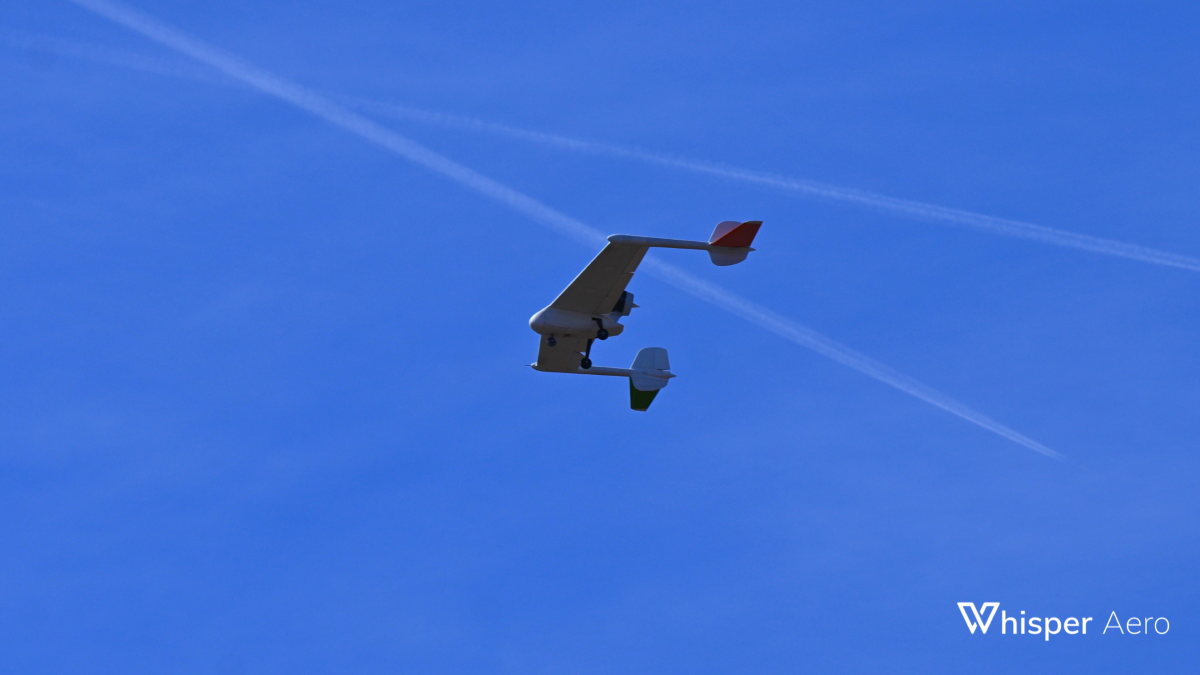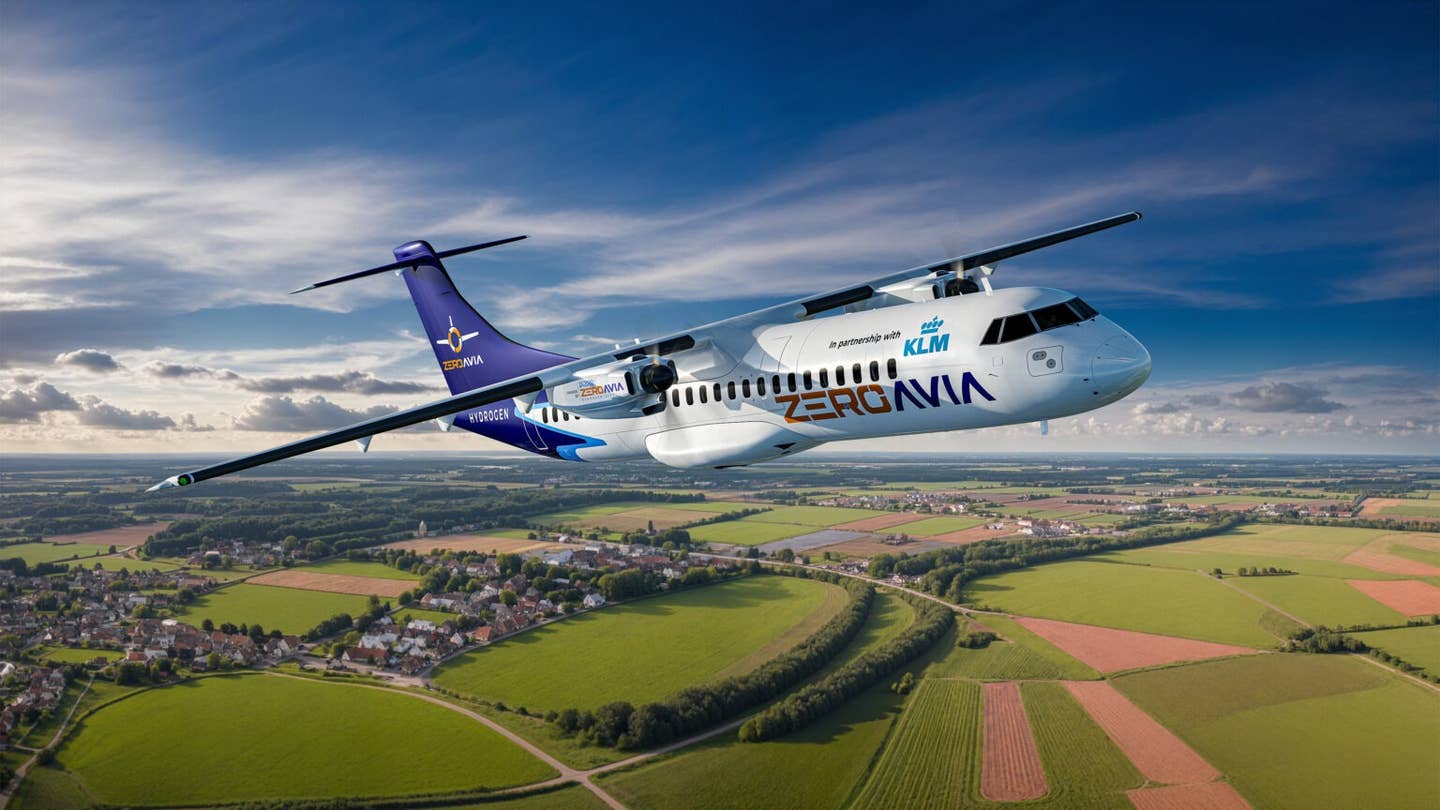Whisper Aero Nabs $32 Million Series A for Ultraquiet Electric Propulsion
The startup aims to enable the next generation of cleaner, quieter drones and aircraft.

A demonstration drone equipped with Whisper’s electric ducted fans takes flight. [Credit: Whisper Aero]
Whisper Aero is taking a page from Muhammed Ali’s book.
Last week, the Crossville, Tennessee-based startup raised $32 million to help create aircraft in The Greatest’s image, capable of floating (flying) silently like a butterfly, and stinging—or in this context, delivering high efficiency—like a bee.
The Series A raise was led by a syndicate including Menlo Ventures, EVE Atlas, Connor Capital and Capricorn’s Technology Investment Fund.
Whisper, which emerged from stealth just under two years ago, makes these Ali-esque flights possible with a fan. But not just any fan—it’s an electric ducted fan that the firm says is “unlike any other,” capable of reducing perceived noise without sacrificing efficiency.
Most companies do this by reducing the amount of pressure on the rotor or propeller, or by slowing the tip speed of the rotating blade. But Whisper has deployed some clever engineering to not only reduce noise, but disguise it.
For example, while the startup’s ducted fan has a very low tip speed, it has a blade passage frequency in the ultrasonic range, inaudible to humans. That’s a feat typically achieved through higher tip speeds.
And in a test, the firm said observers on the ground were unable to hear the fans on a 55-pound drone flying at 200 feet with sustained thrust. That demonstration featured an intelligence, surveillance, and reconnaissance drone equipped with a 10-pound-thrust propulsor—it was trailed at the same altitude by a 2-pound multicopter drone, which was audible to observers.
But that’s only the tip of the iceberg. Whisper’s engineering strategy is to differentiate between the various sounds the propulsor produces, reducing the volume of some noises and masking others by changing their frequency to be more pleasant to humans and animals.
Despite all this, Whisper says that the technologies that reduce noise across the propulsor also deliver 20 percent greater efficiency compared to other ducted fans.
While the startup envisions its technology one day being used in commercial airlines and consumer products, it’s beginning its journey in the defense sector. So far, it’s earned six contracts and agreements with the Department of Defense totaling $2.2 million, with participation by the U.S. Army, Air Force, and Special Operations Command.
Eventually though, co-founder and CEO Mark Moore thinks the tech could help grow other industries.
“If you want to get to scale with delivery drones or eVTOL air taxis, you better be really quiet,” Moore, a veteran of Uber’s (now Joby Aviation's) air taxi initiative Uber Elevate, told TechCrunch. “You’ve got to be quiet enough that you’re not disruptive to those communities.”
Whisper’s team brings plenty of experience to the table, like Devon Jedamski, who previously worked on propulsion systems at Northrop Grumman, Rolls Royce, and MIT.
Other team members hail from firms like NASA, Lockheed Martin, Boeing, Joby, Kitty Hawk, and Pratt & Whitney, a company to which Moore has drawn direct comparisons. Moore’s co-founder, Ian Villa, also spent time with Uber Elevate and Joby.
“Our mission is building a cleaner, quieter, more efficient thrust for aviation and more. Over the last two years, we’ve been improving on the fundamentals. Now we’re moving to a point where the first principles are proven, validated, and verified,” Villa told Aviation Week.
“These next two years are focused on spooling up the first production lines, selling our first defense-focused propulsors, and then continuing prototyping newer products that will make their way into commercial aviation as well as consumer and industrial applications.”
Electric vertical takeoff and landing (eVTOL) aircraft would appear to be a natural next step for the company after drones. In particular, air taxis—whether traveling to and from the airport or elsewhere – could benefit from an “ultraquiet” propulsion system like Whisper’s. And the fact that the startup is home to several air taxi veterans makes that path all the more attractive.
But Whisper is looking beyond the horizon. In a statement, the company said it’s “aiming to weave its tech into the fabric of our everyday lives for a future that’s as considerate as it’s compelling,” hinting at further applications in consumer technology: think leaf blowers, lawnmowers, and other noise-producing devices.
Aiding that vision is the replicability of Whisper’s electric ducted fans. Having developed a highly specialized computational framework over years of testing, the firm can quickly develop new fans for customers, enabling rapid scale for when it targets a new industry.
Before Whisper’s ducted fan becomes as ubiquitous as the iPhone, though, the firm will first need to produce revenue in the defense sector. That’s the short-term goal, Moore and Villa say, before the company tries its hand in the commercial aviation industry—and eventually comes back down to Earth.

Subscribe to Our Newsletter
Get the latest FLYING stories delivered directly to your inbox






